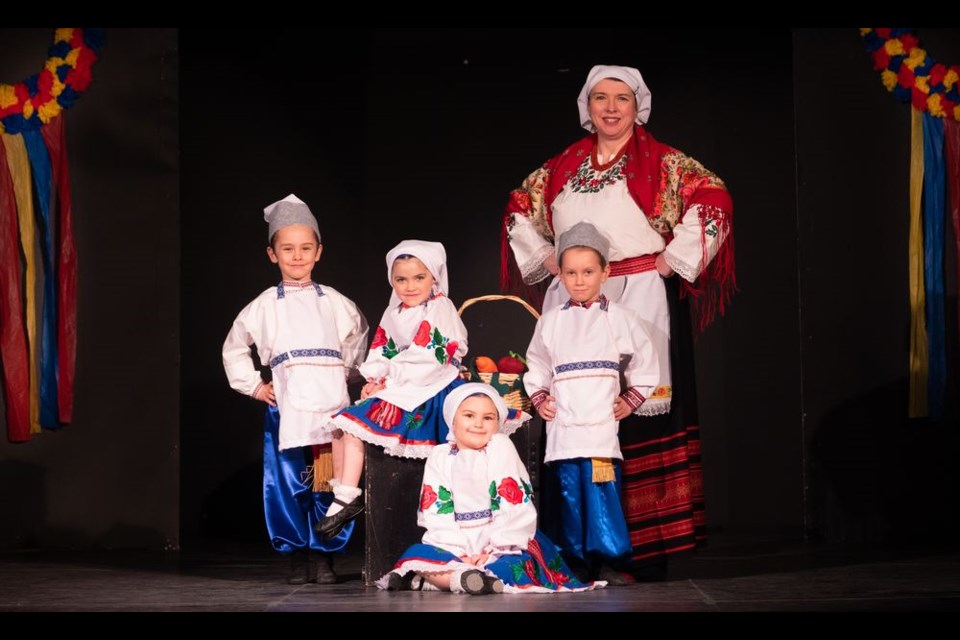Back in October of last year, the Kamsack Sadok Ukrainian Dance Club started training in a season ripe with pandemic regulations.
Working inside the Kamsack Playhouse Theatre, which has been closed for well over a year now, families and students were grateful for the stage and space, despite the constant washing, sanitizing, masks, and distancing that was required to keep in step with pandemic guidelines.
Club president, Dawn Krawetz said that boxed areas were marked out on the floor of the stage with plastic lattice strips that would outline the personal limits of each dancer. Class sizes were kept very small and strict COVID-19 protocols were upheld. Dancers were discouraged from holding hands or making any physical contact during the training and were required to dance in masks.
“It wasn’t easy,” confessed Krawetz. “As an organization, we had to work really hard to follow all of the government guidelines and keep our dancers and community safe. Fortunately, we made it through the season together and everyone is healthy.”
The group has been active in Kamsack for a number of years now – promoting physical fitness, a sense of community, and a conservation of cultural heritage. Krawetz draws on the talents and efforts of Kelly Salahub who handles secretary/treasurer duties and Catherine Maksymetz who promotes fundraising. The three volunteers have been dedicated to keeping the club running – even during these challenging times.
AnnaLee Parnetta, a resident of Yorkton, is a highly accomplished and committed instructor who founded the club in Kamsack 18 years ago. This year, Parnetta guided the beginner group, which consisted of two girls and two boys between the ages of three and six. The youngsters learned a dance from the Poltava region of Ukraine, as well as a character dance entitled, Little Babushkas. During the performance, the children are dressed in babushkas and aprons, dancing through a scene where they make a pot of traditional Ukrainian borscht from start to finish.
Parnetta’s junior group (ages 6 to 11) also worked on two dances throughout the season. One was a Poltava Dance and the second was a Hutsul Dance, representing the culture and traditions of Hutsulshchyna. This year’s junior group consisted of one boy and three girls.
It was five girls and one boy that made up the intermediate group this season. The 12 and 13- year-olds learned a Poltava Dance, a Hutsul Dance, and a character dance entitled, Gossip Line. The story of the dance involved a boy dressing up as a girl to covertly join the girls group that was participating in a line of giggling and gossip. All is well until the boy’s true identity is discovered and the girls take their revenge.
A senior group, consisting of six young ladies aged 13 and older, worked on a Poltava Dance, a Volyn’ Dance, and a Bukovynian Dance. Volyn’ dances represent the culture and traditions of Volyn'. This region is located in north-western Ukraine. Bukovynian Dances represent the culture and traditions of Bukovyna, a transitional highland between Ukraine and Romania.
In total, 20 dancers from 16 local area families participated in the Sadok Ukrainian Dance Club season. A typical season would see the club travel to perform and/or compete in centres like Yorkton, Saskatoon, Regina or Brandon. However, due to the cancellation of all such events, the club dressed up in full costume to perform their final dance numbers on video. Local artist, Dustin Wilson, filmed all of the performances and also took group portraits on stage at Kamsack’s Playhouse Theatre.
The videoed performances were then submitted to the Tavria Ukrainian Dance Club in Regina, for their first ever virtual dance festival. Tavria is one of three clubs hosting a virtual dance festival this year. Once all dance clubs have submitted their dance entries the festival will be available for families and participants to view online.
“The dancers were thrilled to finally perform in the authentic Ukrainian costumes that were ordered thanks to a grant from the Kamsack Affinity Credit Union & Ukrainian Canadian Congress,” reported Krawetz.
Krawetz said the season would not have been possible without the support of the Kamsack Playhouse Theatre. In previous years, families from the dance group would volunteer to work at the theatre during movie screening nights in exchange for theatre rental usage. With the long closure of the theatre to the public, this arrangement was no longer viable. Krawetz suggested that the group would be offering some cash to help support the Kamsack theatre that is currently struggling to keep afloat financially.
��




